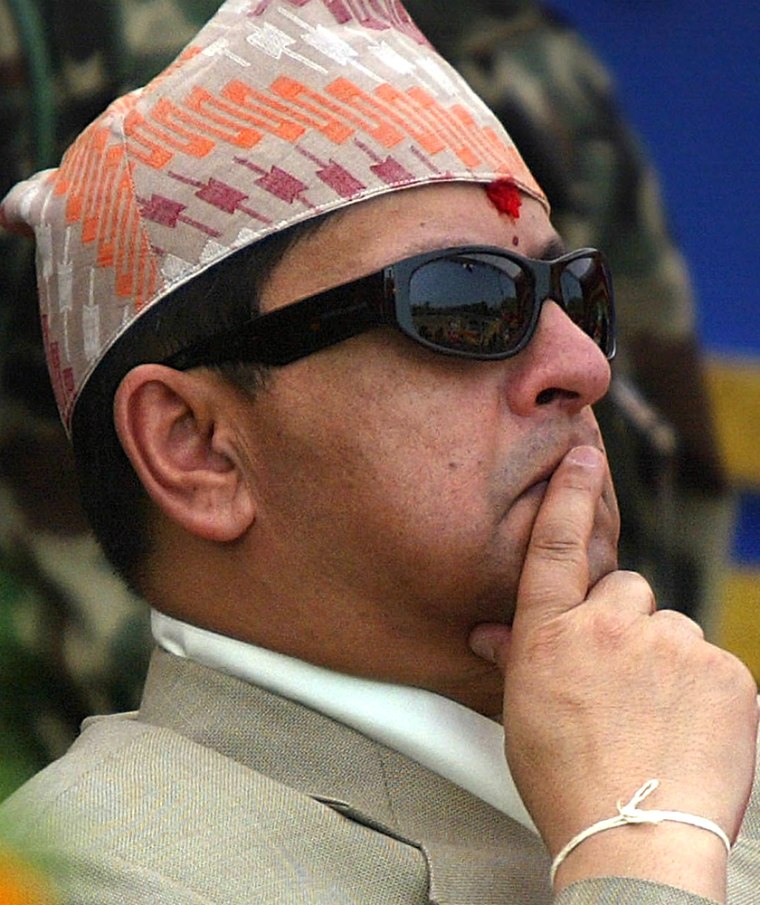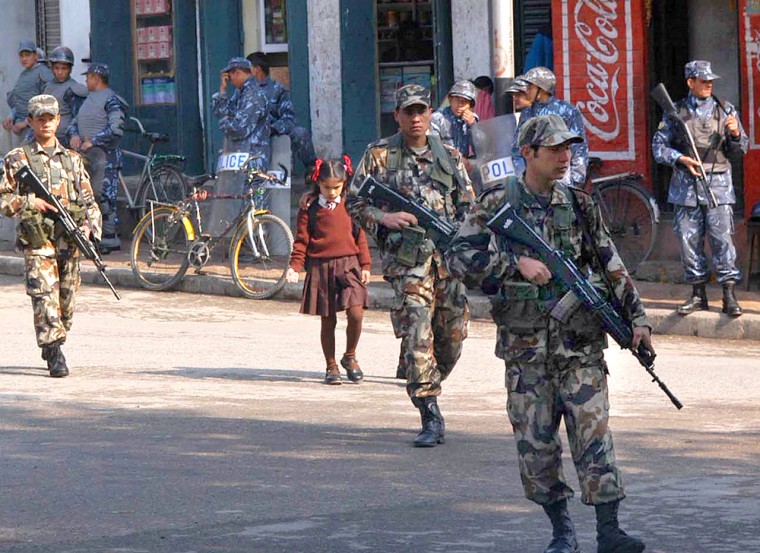King Gyanendra announced a 10-member Cabinet heavily dominated by his own supporters Wednesday, one day after he dismissed Nepal’s government, declared a state of emergency and virtually cut his nation off from the world.
Gyanendra will head the Cabinet, state radio said in a report that gave few further details other than to list the new body’s members.
“The king has expressed confidence that everyone will support and cooperate with the new Cabinet,” the palace said in a statement, according to the report.
An opposition figure said Wednesday that dozens of politicians have been arrested and many more have gone underground.
“We don’t even know how many of our people have been arrested,” said Shovakar Parajuli, an official with the Nepali Congress party, Nepal’s leading opposition political party. He estimated that at least 50 of the group’s top leaders had been taken away by police.
The arrests, which began Tuesday around the time the state of emergency was declared, were continuing on Wednesday, said Parajuli, who had himself gone underground to avoid arrest.
Cut off from the world
The tiny Himalayan nation was isolated from the rest of the world Wednesday, with telephone and Internet lines cut. While the airport was open, only a limited number of flights were going into Katmandu. Civil liberties were also severely curtailed.
The situation could grow even more complicated Thursday, when a nationwide three-day strike, called by the country’s Maoist rebels, could effectively shut down much of the country. The strike was announced before the current crisis began.
The king’s moves Tuesday brought swift condemnation from world leaders, who called it a setback for democracy and said it would undermine the king’s stated goal of fighting the country’s intensifying communist insurgency.
The United Nations, Britain, India and the United States were among those who criticized the king’s actions. Australia advised its citizens not to travel to Nepal.
It was the second time in three years the king has taken control of the South Asian constitutional monarchy, a throwback to the era of absolute power enjoyed by monarchs before King Birendra, Gyanendra’s elder brother, introduced democracy in 1990.
King: Not a coup
Gyanendra denied Tuesday’s takeover was a coup, although soldiers surrounded the houses of former Prime Minister Sher Bahadur Deuba and other government leaders.
The king suspended several provisions of the constitution, including freedom of the press, speech and expression, peaceful assembly, the right to privacy, and the right against preventive detention, according to a statement from the Narayanhiti Palace.
Soldiers were deployed at offices of some private Internet service providers to make sure they remained disconnected.
International condemnation
U.N. Secretary-General Kofi Annan called the king’s actions “a serious setback” that would bring neither lasting peace nor stability to Nepal. “Steps should be taken immediately to restore democratic freedoms and institutions,” Annan was quoted a saying in a U.N. statement said.
The United States called the developments a “step back from democracy,” said State Department spokesman Richard Boucher, adding that they also undermine the Nepalis’ struggle with the Maoist insurgency.
Three human rights groups — Amnesty International, Human Rights Watch and the International Commission of Jurists — expressed concern that the monarch’s moves put “the Nepalese people at even greater risk of gross human rights abuses.”
“Nepal’s last state of emergency in 2001-2002 had led to an explosion of serious human rights violations, including increased extra-judicial killings, enforced disappearances, arbitrary detention, and a breakdown in the rule of law,” the statement said.

In an announcement on state-run television, the king accused the government of failing to conduct parliamentary elections and restore peace in the country beset by rebel violence.
The king fired Deuba as prime minister in 2002, sparking mass protests demanding the restoration of a democratically elected government. He reinstated Deuba last year with the task of holding elections by next month and conducting peace talks with Maoist rebels.
Nepal has been in turmoil since Gyanendra, 55, assumed the crown in 2001 after his brother, Birendra, was gunned down in a palace massacre apparently committed by Birendra’s son, the crown prince, who also died. In all, 10 members of the royal family were killed.
Riots shook Katmandu after the killings. Soon after, fighting intensified between government forces and the rebels, who control large parts of Nepal’s countryside.
The rebels, who say they are inspired by the late Chinese revolutionary leader Mao Zedong, have been trying since 1996 to overthrow the government and establish a socialist state. More than 10,500 people have died since the fighting began.
